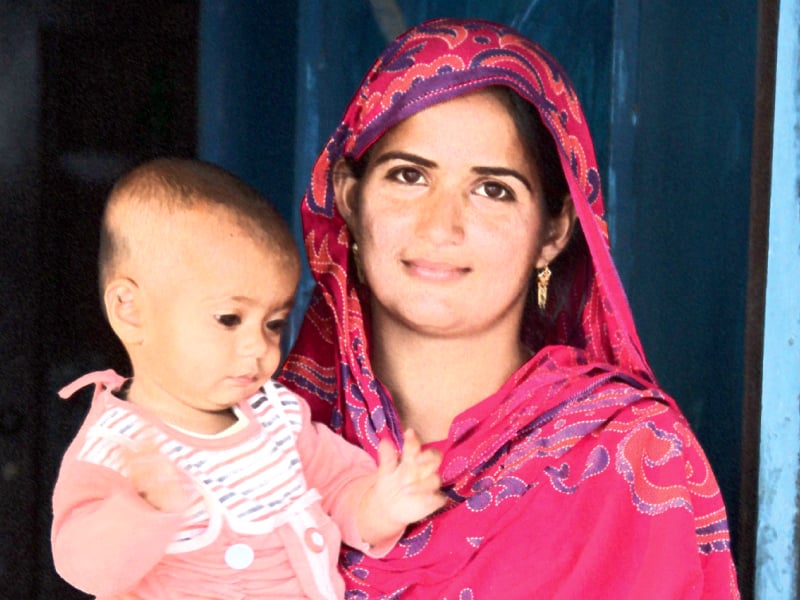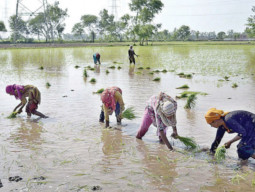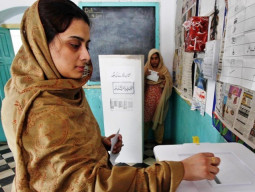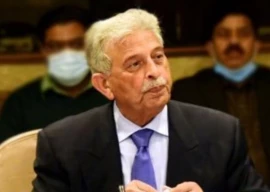
Raheela Asghar Arain, who hails from a remote area of Sindh, has turned the country’s traditional agrarian society on its head. Last October, she was appointed as chairperson of the Farmers Organisation (FO) – the first Pakistani woman farmer to do so.
Raheela’s primary responsibility is to distribute water equally among growers of her region, and to collect water taxes. She knows this will not be easy. In the next four years, she will deal with over 375 growers of Bhan Minor’s eight watercourses.
“It is indeed an honour for me to head the organisation,” says the resident of Chaudhry Muhammad Yousuf village in Jhuddo taluka, Mirpurkhas district. “Yes, it is difficult for me to handle that along with household matters, but I am hopeful my father and my team will guide me if problems arise.”
Raheela, a matriculate, secured 19 out of 24 votes against her opponent Naeem Memon.
Behind every woman
Raheela is the youngest daughter of Chaudhry Muhammad Aslam Javed, the man behind her success and himself an active office bearer of the farmers’ body for the last eight years.

With no male heir, Javed has come to regard his three married daughters as his sons. “My daughters are like my sons,” he says, explaining how he has distributed land among them. “Raheela is very talented. Females in rural areas rarely get such opportunities. Her success will inspire other female growers to come forward and play their part.”
Javed’s father moved to the area in 1967 from Faisalabad, in search of employment. He worked diligently and within three years was able to purchase farm land.
“The victory of Raheela is because of her father,” says Ghai Khan Gurgez, FO’s general secretary. “He [Javed] belongs to a Punjabi family, but has followed the traditions of Sindh’s rural areas.”
It takes a team
Raheela may be the chairperson, but she also has a family to take care of. Her household responsibilities include cooking and looking after her two daughters – three-year-old Iman and a nine-month-old Neha. Luckily, she has her husband, Muhammad Asghar, standing by her side.
“I am happy with my wife’s success,” says Asghar proudly.
Javed is trying to convince Asghar to give Raheela more support. “She respects her husband and in-laws. Their encouragement would be very helpful for her to perform her duties boldly,” he states.
The green fields that stretch on around Raheela’s village indicate equal water distribution among growers. The unity among growers to supply water to tail-enders is also visible. “It is equal water distribution and the honesty of her family that has made her triumph possible,” Gurgez says.
Ghulam Mustafa Ujjan, the director of the Nara Canal Area Water Board (NCAWB), agrees.
“Yes, she is the first lady grower from across the country to hold this position,” confirms Ujjan.
“She has started a new trend, and will be a source of inspiration for others.”
There are around 80 other female landowners in her area. According to NCAWB’s social mobiliser Ghulam Rasool Junejo, all are ‘silent’ landowners. Raheela is the only active female grower of the area.
“She is confident,” says Junejo. “She will certainly play her role positively.”
Published in The Express Tribune, December 28th, 2013.
COMMENTS (2)
Comments are moderated and generally will be posted if they are on-topic and not abusive.
For more information, please see our Comments FAQ


































1714024018-0/ModiLara-(1)1714024018-0-270x192.webp)









Excellent bit of news. Pakisan needs thousands of Raheelas and more importantly thousands of people like her father and her husband.
Salute to her and salute to all Pakistani women.